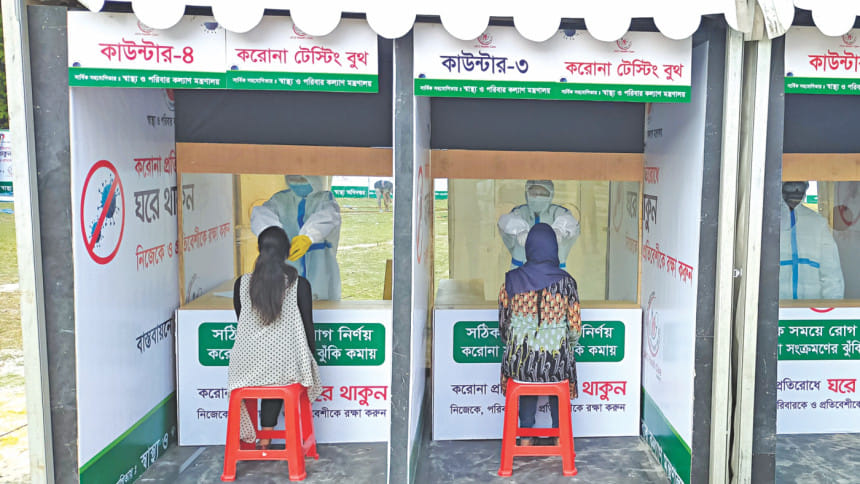Sample Collection: 44 walk-in kiosks to open today

Bangladesh has installed the South Korean model kiosks to collect samples for Covid-19 tests across the country with the support of a non-government organisation.
"We are encouraging other private or non-government organisations to come forward with such ideas. Certainly, such facilities will give a mileage to our testing facilities," Abul Kalam Azad, director general of Directorate General of Health Services (DGHS), told The Daily Star yesterday.
He also said this booth will reduce the manpower needed for collecting samples. The NGO -- JKG Healthcare -- has been tasked with the collection of samples, while the DGHS will carry out the tests at their own lab.
"This will ensure safety of health workers while collecting samples from suspected patients and health professionals don't have to change their personal protective equipment [PPE] kit after every sample," he said.
Dr Sabrina Arif, convener of JKG Healthcare, said, "A total of 44 such sample-collection booths have been installed and we hope to start collecting samples from people to test for Covid-19 from tomorrow [today]."
She said out of 44, eight have been installed in Dhaka, eight in Narayanganj and the rest in other divisions.
"We will install a total of 320 booths in phases across the country following the South Korea model."
The sample-collection booth, which looks like a glass cabin, is made in such a way that the environment inside, where the medical staff stands, is always sterile. The healthcare professionals can collect throat swabs of people who will stand outside the booth.
Sabrina also said the medical technologist standing inside the cabin can use the gloves affixed on the booth to collect samples from people sitting outside the booth.
According to officials, each time after the samples are collected, the gloves and the chair, on which the person whose samples were collected sat, will be disinfected.
"This method will keep the health professionals and also the hospitals safe as the booths will be installed in school or college premises," Sabrina said.
It will also reduce the sufferings of people, as they do not have constantly call the hotline numbers for tests. They can go to the booths for voluntary testing.
The Institute of Epidemiology, Disease Control, and Research (IEDCR) had started testing suspected cases on January 28, at a time when the coronavirus infection was taking a heavy toll on China.
Until march, only the IEDCR had the ability to carry out tests for Covid-19 in Bangladesh.
Over the last few weeks, testing facilities have been expanded to 14 labs -- nine in Dhaka and the rest in five other districts.
A South Korean hospital introduced this testing facility outside the H Plus Yangji Hospital in Seoul.

 For all latest news, follow The Daily Star's Google News channel.
For all latest news, follow The Daily Star's Google News channel. 



Comments